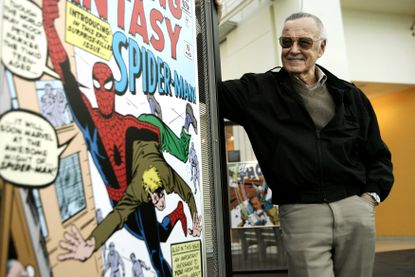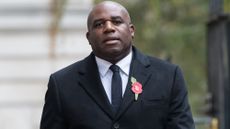Remembering Stan Lee
There are few people who have left as deep a fingerprint on modern pop culture as the Marvel Comics editor


Stan Lee was a man inseparable from his catchphrase, excelsior! He translated it once, on Twitter, explaining that the Latin word meant, "upward and onward, to greater glory!" The exclamation point, though, was what felt most important, characteristic of Lee's optimism. There seemed to be no limits to what he could, or wanted, to accomplish.
On Monday, the legendary Marvel Comics writer, editor, and publisher passed away at 95, and it's difficult to imagine the world without him in it. Even in his twilight years, as his eyesight failed and rumors of elder abuse circulated, he was a force to be reckoned with; in his final interview, from October, he revealed he was still working on new projects. As social media reacted to the news on Monday, there was a sort of unifying awe and disbelief.
There are few people, alive or dead, who have left as deep a fingerprint on modern pop culture as Lee, who helped vault a tiny pulp magazine called Timely Comics into what would become Marvel, the mammoth of the industry. Born Stanley Martin Lieber in December 1922 at an apartment on West 98th Street in Manhattan, his pseudonym would first appear when he was only 19, on a two-page story for Captain America Comics #3.
Subscribe to The Week
Escape your echo chamber. Get the facts behind the news, plus analysis from multiple perspectives.

Sign up for The Week's Free Newsletters
From our morning news briefing to a weekly Good News Newsletter, get the best of The Week delivered directly to your inbox.
From our morning news briefing to a weekly Good News Newsletter, get the best of The Week delivered directly to your inbox.
Alongside artist-writer Jack Kirby, he helped to create the Fantastic Four in 1961, followed by the Hulk, Iron Man, Thor, the Silver Surfer, Black Panther, and X-Men; he would work with Steve Ditko on Spider-Man in 1962, and on Daredevil with Bill Everett in 1964. Thanks in enormous part to Lee's collaborations, Marvel has today surpassed even its predecessor, the Batman and Wonder Woman creator DC Comics.
Lee's output is jaw-dropping to reflect on, particularly today when the film industry is dominated by his creations — Walt Disney bought Marvel Entertainment for $4 billion in 2009, and earlier this year Black Panther topped $1.3 billion globally. But despite the size of those numbers, Lee never lost sight of a more human scale.
For Lee, his story could be as small, even, as a single city — frequently his own, New York, where his family had struggled through the Great Depression in a one-room apartment. It was a city that didn't always look kindly on comic book writers, though: "I used to think what I did was not very important," he admitted in 2014. Prior to creating the Fantastic Four, he fretted to his wife, "We're writing nonsense. It's a stupid business for a grownup to be in."
But Lee never lost faith in connecting with readers; stories of his decision to extend signings to meet with young fans are not uncommon. "Son of a gun, you're a triple threat," he once enthusiastically encouraged an aspiring 11-year-old comic artist who presented Lee with his work. Lee especially relished the "geeks" of the world, calling the phrase a "badge of honor."
Sign up for Today's Best Articles in your inbox
A free daily email with the biggest news stories of the day – and the best features from TheWeek.com
Lee was acutely aware of the readers who looked to their favorite superheroes for guidance and moral clarity — as one Spider-Man comic famously proclaimed, "with great power there must also come great responsibility." The Civil Rights Movement, which dominated headlines through the height of Lee's career, was often reflected in his work: "It wasn't a huge deal to me," he told The Huffington Post of incorporating civil rights issues in the comics. "It was a very normal, natural thing. A good many of our people here in America are not white. You've got to recognize that and you've got to include them in whatever you do."
Marvel's first black superhero, T'Challa, was one of Lee's products, and he was also inspired by Martin Luther King Jr. and Malcolm X when creating the X-Men, which centered on the trials and discrimination that the team of mutants faced.
Lee was more explicit in his editorial columns, which he used to "soapbox." As he wrote in 1968, "Let's lay it right on the line. Racism and bigotry are among the deadliest social ills plaguing the world today. But, unlike a team of costumed supervillains, they can't be halted with a punch in the snoot or a zap from a ray gun. The only way to destroy them is to expose them — to reveal them for the insidious evils they really are." It was a column he re-shared in August 2017, after a counter-protester was killed by a white supremacist in Charlottesville.
Ultimately, for all Lee's uncertainty about "writing nonsense," he would eventually come around on the value of entertainment. "While some readers wanted to escape from the troubling times in which they lived, Lee felt that it was his duty to use the comics platform for good," The Los Angeles Review of Books reflects. For it wasn't just stories that drove Lee to write, after all — it was, as he would occasionally sign off his "Soapbox" columns, Pax et Justitia. Peace and Justice.
In the real world, of course, that wasn't as simple as just writing it. But as any reader of Lee's comics know, he wasn't interested in the easy way out. "Sooner or later," he mused in that same 1968 column, "we must learn to judge each other on our own merits. Sooner or later, if man is to ever be worthy of his destiny, we must fill our hearts with tolerance."
True, the world might not quite be worthy of that destiny just yet. But Stan Lee was always ahead of his time.
Jeva Lange was the executive editor at TheWeek.com. She formerly served as The Week's deputy editor and culture critic. She is also a contributor to Screen Slate, and her writing has appeared in The New York Daily News, The Awl, Vice, and Gothamist, among other publications. Jeva lives in New York City. Follow her on Twitter.
-
 Why is Labour struggling to grow the economy
Why is Labour struggling to grow the economyToday's Big Question Britain's economy neared stagnation in the third quarter of the year
By Sorcha Bradley, The Week UK Published
-
 Best of frenemies: the famous faces back-pedalling and grovelling to win round Donald Trump
Best of frenemies: the famous faces back-pedalling and grovelling to win round Donald TrumpThe Explainer Politicians who previously criticised the president-elect are in an awkward position
By Chas Newkey-Burden, The Week UK Published
-
 Quiz of The Week: 9 - 15 November
Quiz of The Week: 9 - 15 NovemberHave you been paying attention to The Week's news?
By The Week Staff Published